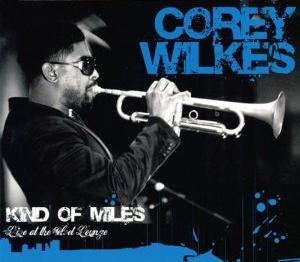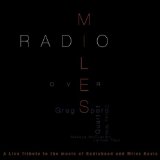
Corey Wilkes: Kind of Miles - Live at the Velvet Lounge (Katalyst)
"Tutu" comes from the Miles/Marcus Miller collaboration of the same name, fitting since in many ways the style these guys play in is closest to that album's sound; they vary the track a bit with some references to "Jean Pierre" from the first comeback LP, The Man with the Horn. The following epic closer finds them drawing from pre-electric Miles again, but with a twist: "So What in Its Right Place" combines the Miles tune "So What," the first track on the immortal Kind of Blue, with Radiohead's "Everything In Its Right Place," the first track on the epochal Kid A, for an even darker, more brooding track than either, though things do get hot at times as the energy oscillates across its 26:34, especially on Nabors's wailing solo and when Spero's solo reaches its two-fisted climax. The only bits on this album that don't work are Zabar's two poorly miked vocals (though not hearing his grunted chants is sort of a blessing), but as usual his percussion contributions are impeccable.
 Wilkes, Spero, and Paul had had some practice with "So What in Its Right Place"; it's also (in a different rendition, of course) the opening track of Spero's album, mostly also recorded in concert. On Radio over Miles, Spero is credited with that brilliant arrangement as well as all the other tracks but "Blue in Green." Drummer Makaya McCraven crafted the latter, redefining the feel of the original with his jittery beat (purists will be aghast, guaranteed). "Jean Pierre" shows up again, this time as itself but with Spero briefly quoting Thelonious Monk's "Epistrophy" in the midst of his long solo over the funky groove of Paul and McCraven.
Wilkes, Spero, and Paul had had some practice with "So What in Its Right Place"; it's also (in a different rendition, of course) the opening track of Spero's album, mostly also recorded in concert. On Radio over Miles, Spero is credited with that brilliant arrangement as well as all the other tracks but "Blue in Green." Drummer Makaya McCraven crafted the latter, redefining the feel of the original with his jittery beat (purists will be aghast, guaranteed). "Jean Pierre" shows up again, this time as itself but with Spero briefly quoting Thelonious Monk's "Epistrophy" in the midst of his long solo over the funky groove of Paul and McCraven.
The electric fusion vein is explored further with a kaleidoscopic jam on Herbie Hancock's "Sly" (from Herbie's album Head Hunters) wherein McCraven lays out some seriously modern rhythms after the more authentic opening. The Radiohead angle is revisited on the only studio track, "Exit Music for a Film" (from OK Computer); with Wilkes playing the melody, the opening would sound like a French noir theme if not for the drum'n'bass hyperosity underneath (with Tim Seisser replacing Paul here, and saxophonist De'Sean Jones adding brawny -- if not particularly jazzy -- tones. The album closes with another song heard on the Wilkes album, but the version of "Yesterdays" here is much more muscular, a bit more like if Radiohead had covered it, especially the powerful pedal points Spero and Paul establish. Near the end an amusing but musically effective "Smooth Criminal" groove/quote goes on so long it practically makes it a medley.
Choosing between these? Radio over Miles is more adventurous and distinctive, and in that sense more important. But I love them both, and even though they share repertoire, they are sufficiently different that having both is far from redundant. - Steve Holtje
